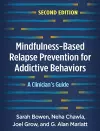
Mindfulness-Based Relapse Prevention for Addictive Behaviors, Second Edition
4 authors - Paperback
£36.99
Sarah Bowen, PhD, a clinical psychologist, is Associate Professor at Pacific University in Portland, Oregon. She is a longtime Research Fellow with the Mind and Life Institute and Trainer at the Center for Mindfulness at the University of California, San Diego. Dr. Bowen specializes in mindfulness-based approaches for treatment of addictive behaviors. Her research and more than 50 publications have focused on mechanisms of change and on treatment adaptations to best serve diverse populations and settings, with particular interests in dual diagnosis and underserved communities. Dr. Bowen facilitates and supervises mindfulness-based relapse prevention groups in numerous settings, including private and county treatment agencies, medical centers, and prisons. She presents, consults, and teaches internationally.
Neha Chawla, PhD, a clinical psychologist, is founder and director of the Seattle Mindfulness Center. In her private psychotherapy practice, Dr. Chawla provides empirically supported mindfulness- and acceptance-based treatments as well as mindfulness-based relapse prevention (MBRP) groups. A co-developer of MBRP, she serves on the clinical faculty of the Department of Psychology at the University of Washington. Dr. Chawla has written on a variety of topics related to mindfulness and has been involved in research on issues related to therapist training and competence. She has facilitated groups in both private and community settings and has conducted numerous therapist training workshops in the United States and internationally.
Joel Grow, PhD, is a clinical psychologist at the Seattle Mindfulness Center and serves on the clinical faculty of the Department of Psychology at the University of Washington. He provides evidence-supported treatment that incorporates self-compassion, mindfulness, and acceptance-based approaches. Dr. Grow was a member of the University of Washington research team that developed mindfulness-based relapse prevention (MBRP), and he remains active in MBRP delivery, training, and evaluation. He has provided behavioral health care and led workshops in a range of private and community settings. Dr. Grow co-developed and served as lead instructor for a 9-month certificate program at the University of Washington, where he received the UW Award for Teaching Excellence.
G. Alan Marlatt, PhD, until his death in 2011, was Director of the Addictive Behaviors Research Center and Professor of Psychology at the University of Washington. For over 30 years, Dr. Marlatt conducted pioneering work on understanding and preventing relapse in substance abuse treatment and was a leading proponent of the harm reduction approach to treating addictive behaviors. He was a recipient of honors including the Jellinek Memorial Award for outstanding contributions to knowledge in the field of alcohol studies, the Robert Wood Johnson Foundation's Innovators Combating Substance Abuse Award, the Research Society on Alcoholism's Distinguished Researcher Award, and the Career/Lifetime Achievement Award from the Association for Behavioral and Cognitive Therapies.